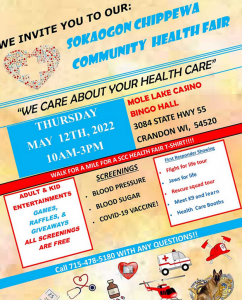By: Mike Splaine, Splaine Consulting; Mary Ann O’Meara, International Association for Indigenous Aging
The National Indian Health Board, with support from the Alzheimer’s Association, awarded five $15,000 brain health-focused mini-grants to tribal organizations to support work on the Road Map for Indian Country.
Grantees picked one of the eight public health strategies from the Road Map that best fit their community. Work started in the fall of 2021 and will wind up in July 2022.
The five organizations include:
- Aleut Community of St. Paul Island
- Cheyenne and Arapahoe Tribes Department of Health
- Kickapoo Tribal Health Center
- Mt. Sanford Tribal Consortium
- Sokaogon Chippewa Community
Recently the grantees held a meeting. They reported on two aspects of their projects—building new partnerships and progress on their road map action.
Not surprisingly, two of the grantees reported that COVID-19 restrictions have limited their progress. Tribes said they still had closed doors, and that was limiting tribal services and activities. Even so, the St. Paul Island, Alaska, community representative shared that a partnership with Southcentral Foundation had been positive.
Southcentral Foundation is an Alaska Native-owned, nonprofit health care organization serving nearly 65,000 Alaska Native and American Indian people living in Anchorage, Matanuska-Susitna Borough, and 55 rural villages in the Anchorage Service Unit.
Southcentral Foundation supplied them with some new and culturally appropriate materials on dementia and brain health. This saved them a lot of time versus having to create new bits.
Southcentral has more than 30 fact sheets for elders. Some resources of particular interest include:
- Trail map to wellness
- Memory loss and dementia
- Advanced dementia
- Spirituality and purpose
- Advanced care planning
See all of their fact sheets for elders by clicking here.
 In addition to COVID-19 shutdowns, staff and tribal leadership turnover have been an additional challenge. Sokaogon Chippewa has “doubled down” on having a significant brain health presence at an upcoming health fair in May.
In addition to COVID-19 shutdowns, staff and tribal leadership turnover have been an additional challenge. Sokaogon Chippewa has “doubled down” on having a significant brain health presence at an upcoming health fair in May.
The Cheyenne and Arapaho Tribes (Oklahoma) aligned their work with other incoming tribal health worker training. They will introduce the topic of dementia to new workers using content from the National Indian Health Board (NIHB).
Their planning work has stimulated some tribal members and leaders to ask more questions about Alzheimer’s and brain health. One outcome is that the tribe now recognizes that this is a bigger issue than previously believed.
The timing was fortunate, as a major health planning activity was underway. This allowed for the introduction of dementia and brain health issues–not just as healthcare issues but more generally about tribal health and well-being in the tribal plan. The hope is that this will lead to some resources and ongoing work after the mini-grant ends later this year.
